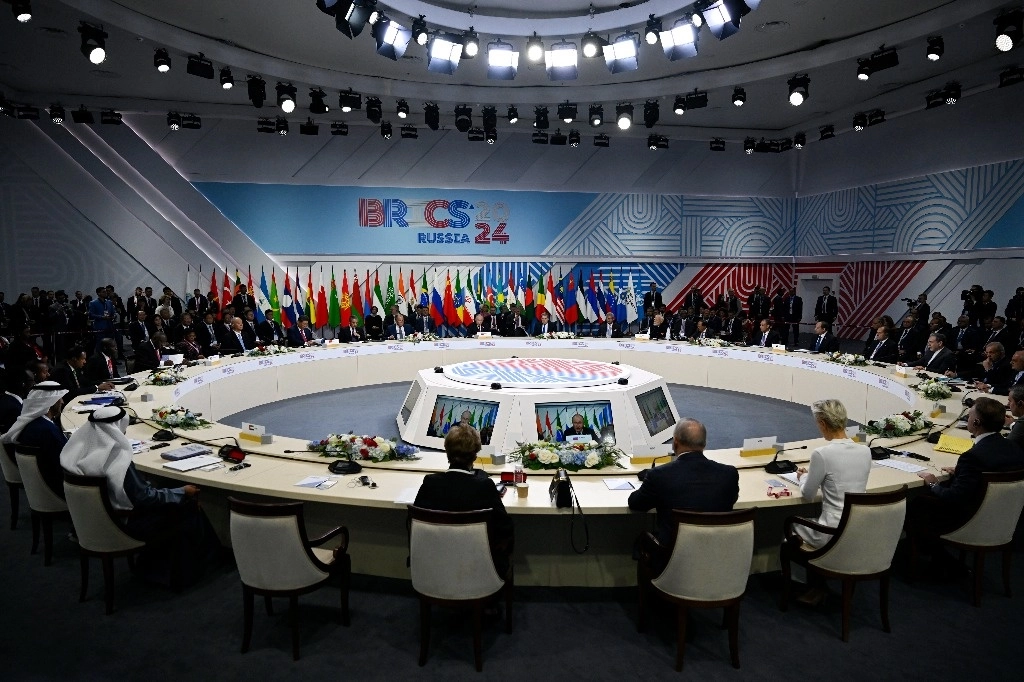Ankara. The BRICS group of countries offered Turkey partner country status, Trade Minister Omer Bolat said, as Ankara continues what it calls its efforts to balance its eastern and western ties.
Turkey, a member of NATO, has expressed in recent months its interest in joining the BRICS group of emerging economies, made up of Brazil, Russia, India, China, South Africa, Ethiopia, Iran, Egypt and the United Arab Emirates.
Turkish President Tayyip Erdogan attended a summit of BRICS leaders hosted by Russian President Vladimir Putin in Kazan last month, after Ankara said it had taken formal steps to become a member of the group.
“As for Turkey’s status as a (BRICS) member, they offered it associate member status,” Bolat said in an interview with private broadcaster TVNet on Wednesday.
“This (status) is the transition process in the BRICS organizational structure,” he said.
Ankara sees the BRICS group as an opportunity to foster economic cooperation with member states, rather than as an alternative to its Western ties and membership in NATO, according to Erdogan.
Turkish officials have repeatedly stated that possible membership in the BRICS would not affect Türkiye’s responsibilities to the Western military alliance.
In addition to being full members, BRICS members introduced a “partner country” category in Kazan, according to the statement issued by BRICS on October 23.
Bolat did not specify whether Ankara had accepted the proposal.
An official from Erdogan’s ruling AK party told Reuters this month that although the proposal had been discussed in Kazan, partner country status would not meet Turkey’s demands for membership.
!function(f,b,e,v,n,t,s)
{if(f.fbq)return;n=f.fbq=function(){n.callMethod?
n.callMethod.apply(n,arguments):n.queue.push(arguments)};
if(!f._fbq)f._fbq=n;n.push=n;n.loaded=!0;n.version=’2.0′;
n.queue=[];t=b.createElement(e);t.async=!0;
t.src=v;s=b.getElementsByTagName(e)[0];
s.parentNode.insertBefore(t,s)}(window, document,’script’,
‘
fbq(‘init’, ‘133913093805922’);
fbq(‘track’, ‘PageView’);
fbq(‘track’, ‘Contact’);
fbq(‘track’, ‘Donate’);
fbq(‘track’, ‘FindLocation’);
fbq(‘track’, ‘Lead’);
fbq(‘track’, ‘Search’);
fbq(‘track’, ‘Subscribe’, {value: ‘0.00’, currency: ‘MXN’, predicted_ltv: ‘0.00’});
fbq(‘track’, ‘ViewContent’);
#Türkiye #close #BRICS
–
**What are the key economic and geopolitical motivations behind Türkiye’s interest in joining BRICS, especially given the group’s focus on challenging the existing global financial order?**
## Türkiye’s Balancing Act: Exploring BRICS Partnership
**Introduction:**
Welcome to World Today News. Today, we delve into the evolving geopolitical landscape with Turkey’s potential involvement in the BRICS group. With us are two esteemed guests: [Guest 1 Name], an expert on international relations, and [Guest 2 Name], a specialist in Turkish foreign policy.
**Section 1: BRICS and Türkiye: A New Partnership?**
* **Host:** Türkiye’s Trade Minister recently announced that the BRICS group has offered Türkiye partner country status. What are the potential implications of this development for Türkiye’s foreign policy?
* **Host:** [Guest 1 Name], could you shed light on the significance of the BRICS group and what it aims to achieve?
* **Host:** [Guest 2 Name], how do you see this offer aligning with Türkiye’s stated goals of balancing its relations with both East and West?
**Section 2: Partner Status vs. Full Membership: What Does Türkiye Want?**
* **Host:** The article mentions that Türkiye has expressed interest in full BRICS membership. However, the offered partner status might not meet Türkiye’s demands. [Guest 1 Name], what are the key differences between these two statuses, and why might full membership be more appealing to Türkiye?
* **Host:** We understand that some analysts believe partner status wouldn’t offer Türkiye the same economic or political clout as full membership. [Guest 2 Name], how significant is this economic dimension for Türkiye, particularly in the current global economic climate?
**Section 3: Potential Allies and Challenges**
* **Host:** Türkiye already holds a prominent position within NATO. How might its involvement with BRICS, even as a partner, impact its relationship with Western allies?
* **Host:** We’ve discussed the economic benefits, but are there any potential geopolitical challenges that Türkiye might face by aligning more closely with BRICS?
**Section 4: Looking Towards the Future:**
* **Host:** What does the future hold for Türkiye’s relationship with BRICS? Will it accept the partner status or continue pursuing full membership?
* **Host:** [Guest 1 Name], based on your expertise, what are the broader implications of Türkiye’s evolving global alliances for the international order?
* **Host:** [Guest 2 Name], what would you say is the long-term strategy behind Türkiye’s desire to diversify its partnerships?
**Closing:**
Thank you to our guests for sharing their valuable insights. This developing situation certainly highlights the complexities of contemporary geopolitics and Türkiye’s unique position in the global landscape. We encourage our viewers to stay engaged with this evolving story and to continue exploring the multifaceted nature of international relations.
